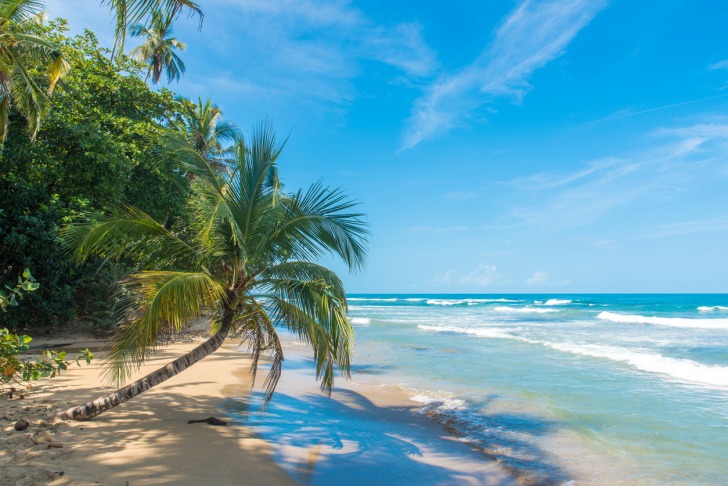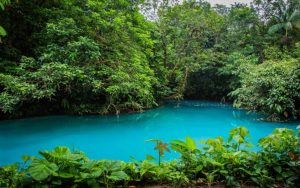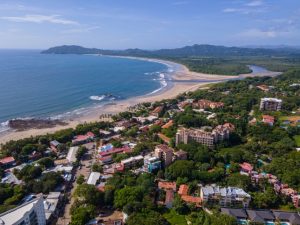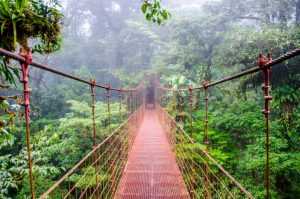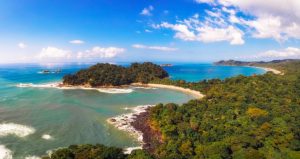 Costa Rica : Safety by City
Costa Rica : Safety by City
Costa Rica - safety as a country Puerto Viejo, Costa Rica was once small, mostly isolated from the rest of Costa Rica.
Once a new road connected the area, it began to bring in tourists and new residents.
The coastal town, situated in the Limon Province part of Southeastern Costa Rica, is now the largest destination for travelers on the small Caribbean coast of Costa Rica.
The town of Puerto Viejo de Talamanca, or just Puerto Viejo, was once called Old Harbour until the government of Costa Rica changed the names of several towns and landmarks to Spanish names.
The beautiful white sand and black sand beaches, the large waves that delight surfers, and the restaurants and other amenities in the town make it the popular tourist destination that it is today.
Travelers enjoy the vibrant culture and the easy-going Caribbean way of life when they visit Puerto Viejo, Costa Rica.
Safety issues concern any traveler, especially first-time visitors to Puerto Viejo, or visitors to any other destination.
Warnings & Dangers in Puerto Viejo

OVERALL RISK: MEDIUM
Although Puerto Viejo is away from many of the larger cities of Costa Rica where violent crimes are more prevalent, there is still a risk for travelers. People who visit Puerto Viejo may become victims of non-violent crimes, such as petty offenses, more often than victims of violent crime. Some travelers may fear the wildlife. Do not disturb the animals. They are likely to be more afraid of you than you are of them. The wildlife will take protective action if it feels threatened by travelers.

TRANSPORT & TAXIS RISK: MEDIUM
Taxis in Puerto Viejo are not always run by large, reputable taxi companies. Look for the red or orange taxis. These taxis are government-regulated in Costa Rica. They have licensed drivers. Some small communities, including beach towns like Puerto Viejo, may not have options other than unlicensed taxis. Make sure that you agree on a price before you get into the taxi. Some drivers will overcharge American travelers. It is safe to use public transportation when traveling to Puerto Viejo or to get around town. Travelers need to hold their luggage or other belongings or put the luggage under the seat. Do not use the overhead bins on buses or other public transport options.

PICKPOCKETS RISK: HIGH
Keep your purse, your wallet, and valuables safe and secure from pickpockets. Unsuspecting travelers may enjoy the beautiful beaches, the gorgeous weather, and the amenities of Puerto Viejo until they discover that they are a victim of a pickpocket. Do not take valuable items that you have to leave unattended with you when you go to the beach. Carry a copy of your passport with you, not the original passport. Make copies of other documents and carry those instead of the original documents.

NATURAL DISASTERS RISK: MEDIUM
Earthquakes are common in Costa Rica. Small tremors are common occurrences daily. Stronger earthquakes are not as common as smaller ones. No traveler has ever been killed by an earthquake that occurred in Costa Rica. Volcanic activity, flooding, and unpredictable weather patterns are sometimes a concern. Heavy thunderstorm activity may cause flash flooding.

MUGGING RISK: LOW
Travelers who are aware of who is around them are unlikely to be victims of a mugger. The risk of mugging increases when travelers venture away from the areas where there are a lot of people. Stay with your group and stay in public areas to increase your safety and lower the risk of mugging or other crimes.

TERRORISM RISK: LOW
Terrorist threats have increased around the world. The coastal town of Puerto Viejo has not had terrorist activities or threats. Some threats exist in more populated areas of Costa Rica where there are gangs and drug dealers or cartels.

SCAMS RISK: HIGH
Protect yourself from becoming a scam victim. Several scams specifically target travelers. Do not fall victim to the scam of being deliberately short-changed when making purchases. Learn some basic Spanish and know basic currency information. Avoid booking online vacation rentals if you are not familiar with the company. Fake vacation rental sites target unsuspecting travelers. Book your vacation to Puerto Viejo with a well-known, reputable agency. Book your car rental when you book your trip. Scammers often advertise cheap car rental prices, but travelers soon discover that they charge huge fees for insurance.

WOMEN TRAVELERS RISK: LOW
Women often travel to Puerto Viejo and have a wonderful, relaxing, and memorable experience. It is okay if you feel safer traveling with friends or with a tour group. Costa Rica, overall, is safe for first-time female travelers and is safe for solo female travelers.

TAP WATER RISK: LOW
The tap water in Puerto Viejo is safe for travelers to drink. It is treated by local officials after being sourced from local reservoirs, wells or other sources. Bring along a refillable water bottle to enjoy the water at Puerto Viejo, Costa Rica.
Safest Places to Visit in Puerto Viejo
Puerto Viejo, Costa Rica features awe-inspiring beaches, distinct species of wildlife, and attractions that are safe for travelers.
Visit Cahuita National Park to see wildlife, or to go snorkeling to see the protected coral reefs.
Soak up the sun with the many other tourists who visit Puerto Viejo.
The paradise town has a reputation for having stunning beaches that are perfect for water sports or just relaxing and getting away from it all.
Visit the Jaguar Rescue Center to see the animal rescue and rehabilitation efforts of this facility.
It got its name from the first animal brought to the facility.
The rescue center is home to sloths, toucans, snakes, monkeys, and a variety of other animal species.
Feel safe taking a kayak ride or going whitewater rafting on local rivers.
Make sure that you go with friends, not by yourself.
Places to Avoid in Puerto Viejo
Many roads in Puerto Viejo are smaller roads that are poorly lit or not lit at all during nighttime hours.
Do not walk on these roads after dark.
Puerto Viejo has an active nightlife scene that many travelers want to enjoy while in town.
Do not go to bars or clubs when you do not know for sure that it is a safe place.
Criminals target travelers who are unfamiliar with the area and the nightlife locations.
Travel in groups, especially when visiting bars or nightclubs.
Avoid the street food that is sold in Puerto Viejo.
Visit restaurants that appear clean and sanitary.
Check reviews to find the best restaurants.
Stay away from the beaches known for rip currents.
Casual swimmers should stick to the less dangerous beach areas.
Safety Tips for Traveling to Puerto Viejo
- Do not accept trips from pirate taxis. Anyone can park their car at an airport, at shops or on the street and claim that they are a taxi driver. Avoid these pirate taxis. Ask the hotel management to call a taxi for you.
- Do not bring valuables. Leave your valuables at home. Those shiny pieces of jewelry make you stand out to muggers and robbers. Keep cameras, phones and other belongings in a secure place.
- Avoid drinking too much. Do not drink too much when enjoying the nightlife in Puerto Viejo. You make yourself an easy target for criminals.
- Do not walk alone at night. You may think that it is safe to take a walk along the beach or in other areas of Puerto Viejo at night. Do not walk alone at night in any part of Costa Rica.
- Do not surf at beaches without lifeguards. The U.S. Department of State – Bureau of Consular Affairs advises against travelers visiting beaches where there is no lifeguard. Some U.S. travelers have died because of sudden rip currents or other dangerous conditions.
- Do not go with anyone who offers to show you the sites. Travelers may become victims of muggings, robberies, sexual assaults, or other crimes if they follow someone that they do not know. Map your destinations before you go, or ask for directions at local shops.
- Keep your distance from the wildlife. The animals may look cute and cuddly, but they may think of you as invading their personal space. Do not approach wildlife. Do not make sudden movements that the animal may think is a threatening movement.
- Avoid flashing your cash. Do not show your cash or valuables when in restaurants, shops, or at the hotel. You will make yourself attractive to criminals.
- Pay your debts. Make sure that you have the money to pay for all your purchases. Pay all your debts before leaving Puerto Viejo. Authorities in Costa Rica can prevent U.S. travelers from leaving the country if they have unpaid debts.
- Carry insect repellent. Several insect-borne illnesses are common in Costa Rica. Puerto Viejo has had outbreaks of dengue fever. Costa Rica is considered a malaria risk by some sources. Protect yourself by carrying an insect repellent.
So... How Safe Is Puerto Viejo Really?
Puerto Viejo is very safe for travelers to visit and create memories.
The beaches, the sites and amenities offer fun and excitement, while the town still has a laid-back vibe.
Petty offenses, such as pickpockets, purse snatching, and bag snatching do occur when travelers visit Puerto Viejo.
Keep valuables at home and carry belongings securely to minimize the risk of becoming a victim of a crime.
Drug trafficking has recently increased around Puerto Viejo.
Stay away from anything that looks like a drug transaction.
Do not purchase drugs unless you want to risk a long prison sentence in a Costa Rica prison.
How Does Puerto Viejo Compare?
| City | Safety Index |
|---|---|
| Puerto Viejo | 52 |
| San Jose | 59 |
| Monteverde | 74 |
| Santa Teresa | 72 |
| Manuel Antonio | 58 |
| Quepos | 55 |
| Tamarindo | 57 |
| Sofia (Bulgaria) | 73 |
| Siem Reap (Cambodia) | 63 |
| Phnom Penh (Cambodia) | 61 |
| Niagara Falls (Canada) | 87 |
| Calgary (Canada) | 82 |
| Buenos Aires (Argentina) | 60 |
Useful Information

Visas
Tourist visas are not required for travelers who spend less than 180 days in Costa Rica. A return ticket is required, or proof of onward travel to go to another country.

Currency
The currency of Costa Rica is the colon. Exchange currency at reputable local banks. Do not exchange money at airport kiosks to avoid higher rates.

Weather
Travelers who visit Puerto Viejo enjoy the tropical weather. The warm temperatures are sometimes dampened by excessive rainfall. Check the forecast for the dates that you plan to visit to know how to pack.

Airports
The Juan Santamaria International Airport in San Jose is the closest airport. Most travelers take a shuttle from the airport to their hotel. The shuttles are not private, so hold onto your luggage and belongings. Some people rent a car when they arrive at the airport, while other travelers rely on domestic flights for faster travel.

Travel Insurance
Purchase travel insurance when you plan to visit Puerto Viejo. Many travelers from the U.S. report items being stolen, especially on public transportation or at the beaches. Traffic laws are lax or largely ignored in many areas of Costa Rica. The increased risk to safety is another reason to purchase travel insurance.
Puerto Viejo Weather Averages (Temperatures)
Average High/Low Temperature
| Temperature / Month | Jan | Feb | Mar | Apr | May | Jun | Jul | Aug | Sep | Oct | Nov | Dec |
|---|---|---|---|---|---|---|---|---|---|---|---|---|
| High °C | 27 | 28 | 28 | 29 | 29 | 29 | 29 | 29 | 29 | 29 | 28 | 28 |
| Low °C | 23 | 23 | 23 | 24 | 25 | 25 | 24 | 24 | 24 | 24 | 24 | 23 |
| High °F | 81 | 82 | 82 | 84 | 84 | 84 | 84 | 84 | 84 | 84 | 82 | 82 |
| Low °F | 73 | 73 | 73 | 75 | 77 | 77 | 75 | 75 | 75 | 75 | 75 | 73 |
Costa Rica - Safety by City
| City | Safety Index |
|---|---|
| Manuel Antonio | 58 |
| Monteverde | 74 |
| Puerto Viejo | 52 |
| Quepos | 55 |
| San Jose | 59 |
| Santa Teresa | 72 |
| Tamarindo | 57 |
